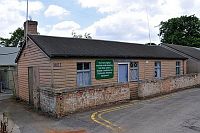Regular readers will probably have spotted the odd reference to Bletchley Park in some of our articles, well known as the place where the Enigma codes were broken but it is also the place where Colossus was created – a machine that was the forerunner of many modern computers – and used to break the more advanced Lorenz code.
Thanks to the propagation effects of the radio signals being used during World War II, listening stations (Y-stations) based in England were not ideally suited to monitoring enemy signals from Europe, and Scottish outstations were established in places such as Montreathmont and Kingask, providing valuable information when the main centre was unable to pick up the signal.
Following a visit to the National Codes Centre at Bletchely Park, the state of decay and lack of funding moved one visitor to raise a letter to The Times, signed by 100 academics saying the code-cracking centre and crucible of the UK computer industry deserves better. Describing the state of disrepair, and blue tarpaulins used in an attempt to prevent further damage, Dr Sue Black, head of the computer science department at the University of Westminster, noted that the centre had been ineligible for Lottery assistance until recently, but also that even a successful application would mean at least another year before any monies were made available.
Bletchely has not fared well in the preservation stakes, and even as the war ended, its most famous resident, the Colossus computer which gave the British so much valuable information known as ULTRA – Ultra Top Secret – was subject to a total destruction order by Churchill, presumably to stop the technology being picked up later by enemies. Only a few scraps of the original machine survived, and are now on display. In order to show the machine itself, those involved had to fund a reconstruction of the original.
There are many places vying for all sorts of funding, but it just doesn’t seem right that somewhere such as Bletchely, with what must number amongst some of the most historically significant events of the war having taken place there, does not have its future secured by national funding, and has to sell the tiles from its roof ro raise funds to make that roof watertight.

